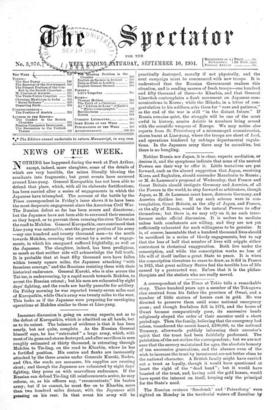Neither Russia nor Japan, it is clear, expects mediation, or
desires it, and the symptoms indicate that none of the neutral Powers see their way to offer it. Little tentatives are put forward, such as the absurd suggestion that Japan, receiving Korea and Saghalien, should surrender Manchuria to Russia ; or M. de Lanessan's proposal of Wednesday, that France and Great Britain should instigate Germany and America, of all the Powers in the world, to step forward as arbitrators, though Japan, as M. de Lanessan must know, distrusts Germany, and America dislikes her. If any such scheme were in con- templation, Great Britain, as the ally of Japan, and France, as the ally of Russia, would be the natural Powers to offer themselves; but there is, we may rely on it, no such inter- ference under official discussion. It is useless to mediate unless both combatants are willing, and they are not yet sufficiently exhausted for such willingness to be genuine. It is, of course, lamentable that a hundred thousand lives should be sacrificed in a series of bloody engagements, but to say that the loss of half that number of lives will cripple either contestant is rhetorical exaggeration. Both live under the conscription, and while the conscription works no loss of life will of itself incline a great State to peace. It is when the conscription threatens to cease to draw, as it did in France in 1815, that great military States feel the terrible loss of life caused by a protracted war. Beore that it is the philan- thropists and the statists who are really moved.


































